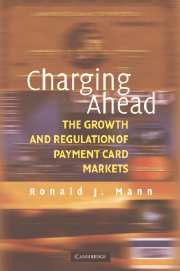Book contents
- Frontmatter
- Contents
- Figures and Tables
- Acknowledgments
- Introduction
- PART I THE BASICS OF PAYMENT CARDS
- PART II EASY MONEY
- 3 In Defense of Credit Cards
- 4 The Psychology of Card Payments: Card Spending and Consumer Debt
- 5 Over the Brink: Credit Card Debt and Bankruptcy
- PART III THE PUZZLE OF PAYMENT CARDS
- PART IV REFORMING PAYMENT SYSTEMS
- PART V OPTIMIZING CONSUMER CREDIT MARKETS AND BANKRUPTCY POLICY
- Conclusion
- Appendix: Country-Level Data
- Notes
- Bibliography
- Index
3 - In Defense of Credit Cards
Published online by Cambridge University Press: 06 July 2010
- Frontmatter
- Contents
- Figures and Tables
- Acknowledgments
- Introduction
- PART I THE BASICS OF PAYMENT CARDS
- PART II EASY MONEY
- 3 In Defense of Credit Cards
- 4 The Psychology of Card Payments: Card Spending and Consumer Debt
- 5 Over the Brink: Credit Card Debt and Bankruptcy
- PART III THE PUZZLE OF PAYMENT CARDS
- PART IV REFORMING PAYMENT SYSTEMS
- PART V OPTIMIZING CONSUMER CREDIT MARKETS AND BANKRUPTCY POLICY
- Conclusion
- Appendix: Country-Level Data
- Notes
- Bibliography
- Index
Summary
Policy analysis of the credit card has focused on two topics. The first is a series of works criticizing the contribution of the credit card to the consumerist ethos of the United States. A second topic, researched mainly by economists such as Lawrence Ausubel, on the one hand, and David Evans and Richard Schmalensee, on the other hand, debates whether the structure of the credit card industry has led to collusive and above-market pricing. What is missing, however, is a serious and critical assessment of the benefits that credit cards provide to society. Without a fair acknowledgment of the benefits, analysts cannot hope to provide a credible accommodation of the concerns the critics of credit cards articulate.
Paying with Credit Cards
Credit cards assumed their place as the dominant payment system in the United States largely without a credit feature. They had functional advantages over competing systems, and credit card companies paid more attention to information technology.
As Chapter 7 explains, the credit card rose to prominence because it was a more effective device for business travelers making payments to merchants away from home. From the perspective of the cardholder, it is easier to carry a credit card than it is to carry cash. From the perspective of the merchant, it always has been easier to verify the creditworthiness of a person holding a credit card than a person offering to pay with a check. Conceptually, this is an institutional use of information technology.
- Type
- Chapter
- Information
- Charging AheadThe Growth and Regulation of Payment Card Markets around the World, pp. 37 - 44Publisher: Cambridge University PressPrint publication year: 2006

